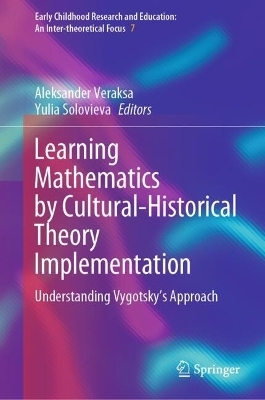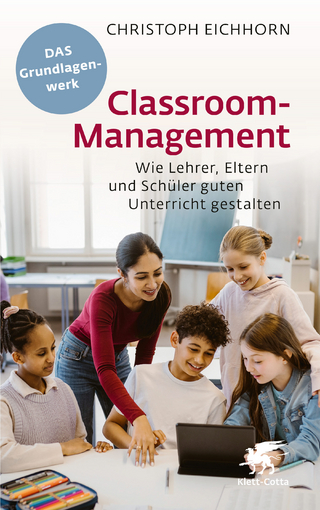
Learning Mathematics by Cultural-Historical Theory Implementation
Springer International Publishing (Verlag)
978-3-031-66893-7 (ISBN)
This book is devoted to the topic of mathematical skills development, which was the focus of Vygotsky's cultural-historical theory. It offers descriptions of studies of development of visual modelling in children and its use for educational purposes. Special attention is given to concrete examples of Vygotsky's work and educational programs that makes it possible to replicate the results in various settings.
The work also addresses conditions, means and predictors of mathematical concepts acquisition at different ages and educational levels (preschool, primary and middle secondary education). The book shows theoretical solidity of cultural-historical approach and experience of its implementation in teaching of mathematical knowledge in childhood and the study of the process of psychological development.
Aleksander Veraksa is a specialist in child psychology and education in early years. He is a Head, Chair of Educational Psychology, Lomonosov Moscow State University, Head of Lab of Child Psychology and Digital Socialization of the Federal Scientific Center of Psychological and Multidisciplinary Research. He has a vast experience of cross-cultural studies and implementation of the results obtained in the form of educational programs. He has more than 100 publications in peer-review journals and several monographs published.
Yulia Solovieva, Ph.D. in Psychology by Moscow State University. Head of Master Program in Neuropsychological Diagnosis and Rehabilitation of Faculty of Psychology of Puebla Autonomous University, Mexico (2016-2020). University Teacher and Researcher of Puebla and Tlaxcala Autonomous Universities, Member of National System of Researchers of Mexico (level 2), Doctor Honoris Causa by National University of Perú (Huánuco), member of Latin American Society of Neuropsychology (SLAN), member of Executive Committee of SLAN (2007-2011). Member of the System of Researchers of Puebla Autonomous University. Member of Counsel of Science and Technology Committee of the State pf Puebla, Mexico (since 2020). Invited lecturer of Special Program in Child Neuropsychology in Javeriana University in Cali, Colombia, Master in Neuropsychology of Sevilla University, Spain, Master Program in Neuropsychology of Azuay University of Cuenca, Ecuador, among others. Author of over 200 publications in Spanish, English, Russian and Portuguese dedicated to topics such as developmental psychology, child neuropsychology and neuropsychology.
Part I. Theory and methodology for teaching of mathematics in cultural-historical approach: 1. Mathematics as system of cultural-historical knowledge and science.- 2. Development of symbolic functions and imagination as the basis for learning of mathematic at school: continuation of the dialogue between Piaget and Vygotsky.- 3. Psychological means and mathematical concepts acquisition in preschool age: which are better to use?.- 4. The pre-number period of teaching mathematics: psychological analysis of the different mathematical programs from the Cultural-Historical point of view.- 5. Mathematics Education and inclusion: reflections from the Cultura-Historical Theory.- 6. Teaching orienteering activity: principles and practices for the mathematics teaching organization.- 7. Processes of abstraction, generalization, and mathematical concepts formation: a reflection based on the Cultura-Historical Theory.- Part II. Research and proposals for teaching of mathematics: 8. Analysis of methods for teaching of mathematics in primary school according to Vygotsky's and Piaget's perspective.- 9. Mathematical abilities and self-regulation of the younger schoolchildren in different educational programs: longitudinal.- 10. Taysin M. Scaffolding multiplicative concepts' formation: a way of digital support.- 11. The knowledge of future Mathematics teachers about the logical procedure to identify as a way for the formation of mathematical concepts study.- 12. The math club as a space for teachers' learning: an analysis based on cultural-historical activity theory.- 13. Development of conceptual thinking in mathematics: cultural-historical experience in Brasilian context.- 14. Contributions of the cultural-historical theory in the teaching activity of time and area measures.
| Erscheinungsdatum | 26.09.2024 |
|---|---|
| Reihe/Serie | Early Childhood Research and Education: An Inter-theoretical Focus |
| Zusatzinfo | VI, 279 p. 65 illus., 49 illus. in color. |
| Verlagsort | Cham |
| Sprache | englisch |
| Maße | 155 x 235 mm |
| Themenwelt | Sozialwissenschaften ► Pädagogik ► Schulpädagogik / Grundschule |
| Schlagworte | Concept Acquisition in Education • Cultural-historical Theory Implementation in Mathematics • Digital Support Design • Early childhood education • Educational Program in Mathematics • Mathematical Abilities • mathematical education • Multiplicative Concepts in Education • Preschoolers • primary education • Psychological Means in Education • Self-Regulation in Education • teaching mathematics |
| ISBN-10 | 3-031-66893-6 / 3031668936 |
| ISBN-13 | 978-3-031-66893-7 / 9783031668937 |
| Zustand | Neuware |
| Informationen gemäß Produktsicherheitsverordnung (GPSR) | |
| Haben Sie eine Frage zum Produkt? |
aus dem Bereich


